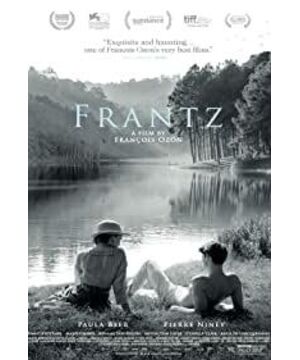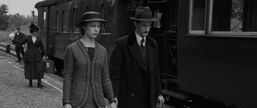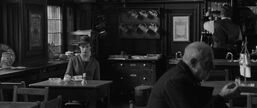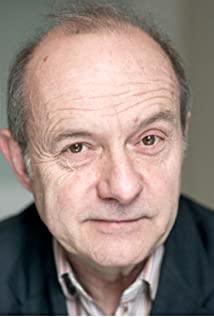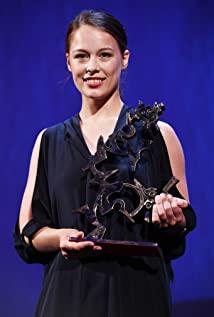Before watching this movie, I thought that the love stories circulating in the world all have some "routines": two people ultimately missed each other because of fate or identity. From Romeo and Juliet, to Liang Shanbo and Zhu Yingtai. From Notre Dame de Paris to the Blue Bridge of Soulbreak. From Swan Lake to Aida. No exception. It seems that tragedy is the best footnote of love, even at the cost of death to nail such a tragedy into eternity. It seems that the imperfection in the world can achieve spiritual eternity.
I thought that was the story Frantz's film was going to tell: a tragedy. Until the second half of the film, Anna came to the Paris Opera House to look for Adrien. A beautiful violin suddenly pulled me into another story: Scheherazade
Scheherazade, often translated as Sheherazade. Played in the film is Rimsky-Korsakov's symphonic suite of the same name. I think this detail first reflects the intention and depth of the director team: Rimsky-Korsakov was also a naval officer, but he was also not a person who was enthusiastic about war; For symphonic works, the first violin plays an extra important role, often requiring a solo Scheherazade theme in the movement (a bit like the Promenade in
But what's most interesting is Scheherazade's story itself. If the name sounds unfamiliar, then "One Thousand and One Nights" must be famous. The story goes from the Persian Empire that King Shanruyar killed his wife when he found out that he was unfaithful. After that, he would marry a girl every day, and kill him the next morning as a revenge. The daughter of the minister Vizier, Scheherazade, volunteered to marry the king in order to save the innocent woman. She used the storytelling method to attract the king, and every night she told the most wonderful place just before dawn, so that the king could not bear to kill her because he loved to hear the story, and allowed her to continue to tell the next night. Her story has been told one thousand and one nights, and the king was finally moved and grew old with her.
Scheherazade is only an introduction to the story of "A Thousand and One Nights", and is therefore not as famous as many of the stories. But it is so subversive, telling a story that did not originate in love, but finally "lives together forever". Compared with the aforementioned masterpieces, it even seems a little ironic.
I think that's the ultimate theme of the whole movie. It tells of the redemption of one soul for another. It is the mutual dependence and encouragement between souls. It is not only a tragedy, it also hopes that viewers can experience the toughness of the soul and believe that suffering does not necessarily have to end in tragedy.
Dr. Hoffmeister old. Having experienced the pain of losing his son, he also angrily refused to see a doctor for a Frenchman. But in front of his compatriots, he finally said the bitter reflection that "we are just a group of fathers celebrating for killing someone else's son". He was cautious and reserved, but also said simple and emotional words to Anna, "You used to help us survive. Now it's our turn". The Hoffmeisters have helped Anna, and by the end of the film they have rekindled their passion for life with Anna's help.
Adrien is a typical soul seeking redemption. When he first came here, he was depressed and imitated, but when faced with the ubiquitous hostility, he showed both understanding and difficulty concealing his loss. First, she had to weave lies, and finally she bravely told the truth in the face of Anna. Unable to bear to face all this, he chose to flee and return to his hometown to heal the wounds with the help of relatives and friends. Facing the found Anna, he once again fell into the dilemma of love.
In the film, Anna suffers the most, because time and time again, hope seems to be right in front of her: her fiancé's friend before his death, a confidant who has a heart-to-heart connection, and even chooses to forgive after confessing everything. But in the end, there was more sadness. She also cried bitterly and even sought short-sightedness, but I would rather believe that at the end of the film, Anna bravely walked out of all this and finally completed a redemption for herself.
The touchingness of the film lies in the authenticity and sincerity of every emotion displayed. Sincere is a word that many people write at the end of letters/emails every day, but they don't necessarily actually practice it. Whether you truly love someone, sincerely hate someone, sincerely mourn someone, or mourn a lost emotion. Acknowledging the love and pain deep within yourself, and being grateful that there are people and things in this world that can make you sensitive and abundant. Such a kind of unforgettable, but also make the heart seem to become alive.
What touched me the most was Anne's reply to Adrien in the film, .... notre peine est toujours profonde. ...
Our pain is still deep.
Yes, the pain is not in how intense it is, but in how deep it is buried in the heart.
View more about Frantz reviews


